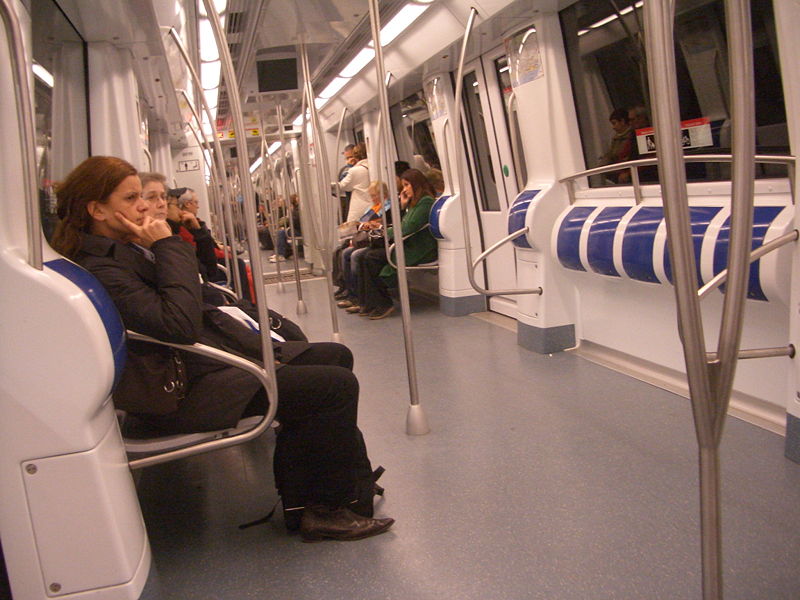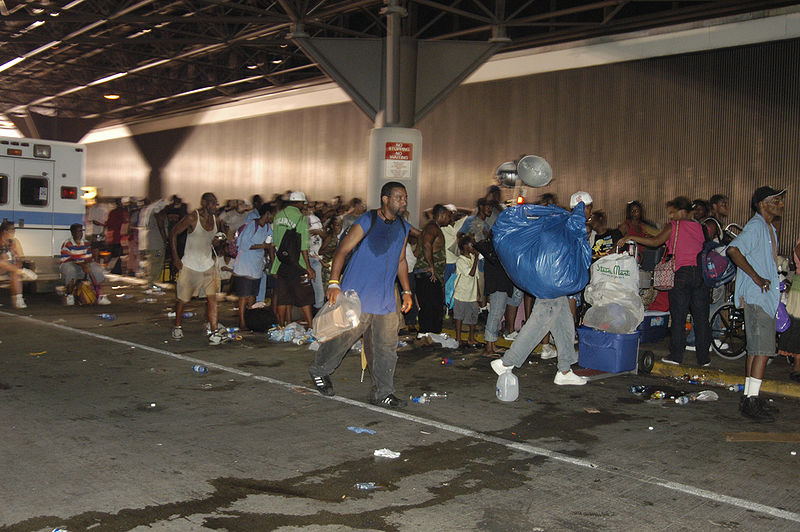Fear and insecurity keep many a would-be traveler firmly ensconced at home.
What if I’m mugged? What happens if I’m trapped in a disaster? …I get lost?...robbed? …or worse?
Yes, security is a concern and I’m not going to say bad things will not happen to you. I will say that even everyday life is a game of playing the odds. Can all these bad things happen to you on a trip? Yes. Can they happen to you at home too? Yes. Is there a great chance that they will happen? No.
It is rare that anything bad happens to you while traveling but it can crop up. Keep in mind that I travel a lot more than your average tourist, but all of the following have happened to me at one point or another in my 50 years of traveling…riot, terrorist attack, pickpocket attempt, lost in the wilderness, injured, taken to the emergency room for sickness, car accident, blizzard, tornado warning, and floods.
…but I still travel, still enjoy it, and still go with little to worry about. Why? Because these were very rare occurrences and by being prepared and level headed, I was able to emerge unscathed.
Here are some tips I’ve come across over the years to keep my family and me safe when traveling…
BEFORE YOU LEAVE HOME…
Secure your house when you leave. Don’t let the world know you’ll be gone. If you have a trusted family member or friend, ask them if they can house sit for you. If not, have a trusted neighbor keep an eye on your place. Ask them to check for any fliers or newspapers left on your doorstep. Have an order at Amazon on the way? Ask them to watch for that too.
Visit your local post office and have them suspend mail delivery while you're gone. You can also do this online at usps.com but that has never worked for me, an in-person visit is better.
Visit your local post office and have them suspend mail delivery while you're gone. You can also do this online at usps.com but that has never worked for me, an in-person visit is better.
Get some timers from the hardware store. They’re not expensive and you can program the lights to come on and off at various times while you’re away.
Leave a radio tuned to a talk radio station and turn it up loud enough so that someone outside might think someone is home.
If you have two cars, park one up against the garage door so that it would be impossible to open without moving the car.
AT THE HOTEL…
If the room assigned to you seems like it’s in a sketchy area…say way in the back, next to a stairwell…ask the hotel to move you to a room you are more comfortable with. Unless the hotel is completely booked, management should accommodate you. I have yet to run across a hotel that wouldn’t work with you if there is some reason you don’t like your initial room.
While you’re in the room, always latch the dead bolt and hang up the “Do Not Disturb” placard.
When you’re out of the room, leave the “Do Not Disturb” placard on the door unless you’re expecting housekeeping to clean the room while you’re out. Leave some lights on. Leave the radio or TV on. Make it seem like someone is in the room. Either lock your valuables in the safe (if there’s one in the room), have the front office lock them in their safe, or take them with you.
If you have a car, park it as close to the entrance as possible unless you really need it by your room. A car in a populated area is less likely to be broken into.
WHILE OUT AT YOUR DESTINATION…
Travel in numbers. Families traveling together are great because they’re a ready-made group. If you’re going solo, try to be where there are a lot of people...think Times Square, not some quiet street in the Lower East Side. I’m amazed when traveling to see young, attractive women walking alone along quiet streets or through parks after dark. That is the one thing you don’t want to do…always have someone else nearby.
Avoid dark, lonely places. Seems like a no brainer but sometimes when you’re out and about you might be confronted with the choice of dark and lonely or darker and lonelier. Again, try to at least be with a group if you can or go back the way you came to find a better route. We had this happen to us in France where we ended up walking by a small park after dark where a man was shooting up heroin with his big dog by his side. Fortunately, we were a group of five and felt a bit more secure in our numbers.
Keep your valuables out of sight and out of the “usual” places. Men seem to keep their wallets in their back pockets 99% of the time. Put it in your front pocket to keep it away from pickpocket fingers or use a money belt. On a very crowded Metro in Paris I felt someone reaching into my back pocket. With my wallet in the front pocket, all they got was the used Kleenex that I had just blown my nose with.
Make copies of your passport, credit cards, travel vouchers, and any other paper work you might need along the way. I will depart with many of my travel expert brethren and say DO NOT bring these copies with you. If they fall into the wrong hands, you might as well hand them the credit cards to begin with.
Instead, leave a copy with a trusted family member or friend that you can call if needed. Also, I scan this information, put it into a Word document that I have encrypted with a password, and e-mail myself a copy…that way I can retrieve that e-mail anywhere in the world when I need it.
Some people also recommend you keep a twenty dollar bill in your pocket in case you are robbed. Give it to the robber, or toss it at them if you can, and beat a hasty retreat. Whatever you do, don’t try to stand your ground…it’s just money and not worth getting hurt or killed over.
If you’re going to have a car, make sure you have valid insurance at your destination. American insurance is not valid in much of the world; call your agent before leaving to see if you are covered. If not, procure coverage either before you go (cheaper) or at the rental counter (expensive). If you’re in an accident, contact authorities immediately or have a local do it for you. Keep cool, calm, and collected. If there are any injuries, focus on the injured getting help before anything else. (I'm adding this as an update, if you buy insurance beforehand, get a memo from the insurance company that specifically states it is good for the country you're visiting...Costa Rica would not have been such a drag if I had done this ahead of time - Ed)
DISASTERS AND SUCH…
I remember very well the July morning in 2005 when we were turned away from the Underground in London due to an “electrical malfunction” and no bus would let us board outside. After returning to our hotel, the BBC let us know what really happened…terrorists had set off a number of bombs in the Underground and a bus killing many people. The city was shut down.
Luckily, we were near our hotel and had a home to return to.
When disaster strikes, if you are in or near a safe place…stay there. Wait for official word to tell you what to do. If you are not in a safe place, seek out other local people to find out the best route to safety. If you’re in a wheelchair, keep in mind that many people will not be automatically thinking of the most accessible route…you may have to depend on the kindness of strangers to help you. Fortunately, in our experience, locals around the world tend to be kind to strangers in need.
This shouldn’t need to be said but always go away from danger, not toward it. Don’t go to the waterfront to see the tsunamis approaching, or outside to see the twister, and stay away from buildings after a big earthquake.
If you are injured, let someone know you need help.
In extreme cases, look for someone in authority or a relief provider and stick with them until you are safe.
INSURANCE…
What about travel insurance to help you in these situations? Be aware that insurance only helps afterward and does not prevent. Balance the cost of the insurance versus the benefit.
Our car and medical insurance is valid throughout the United States and we usually go without travel insurance when we’re in country. The hotel and airfare won’t cripple us if we need to forfeit it so the risk doesn’t balance out with the cost for us here.
When we’re traveling internationally, however, we always get insurance. A good policy will include emergency medical, auto accident, trip interruption and cancellation, medical evacuation, personal item coverage and more. We like the peace of mind and rarely have to use it but it’s nice to know we have it if we need it…it did help one time when we had a fender bender in France.
Always read the policy details very carefully before purchasing. Note that many policies won’t cover things like trip cancellation if it is because you just changed your mind or your office cancelled your vacation time.
Now that we’ve covered many bad things that can happen to you on vacation, know that it is an extremely rare occurrence. Yes, some of these things have happened to us over half a century of traveling but, usually, they just make for a good story when we get back. Don’t let the fear of the unknown keep you at home. Manage it and use these and other common sense tips to minimize the chance that anything bad will happen to you and enjoy the world.
-Darryl
Copyright 2012 – Darryl Musick
All Rights Reserved







These are all excellent tips! Thanks for sharing. :)
ReplyDeleteYeah I agree, excellent tips. We need to make sure our safety and security if we travel
ReplyDeleteIt is always good to be reminded of safety tips. We do have a tendency to get complacent. I was struck by your tip to travel in groups. I just heard on the news that a female tourist was assaulted as she was walking by herself at 4 am!
ReplyDelete